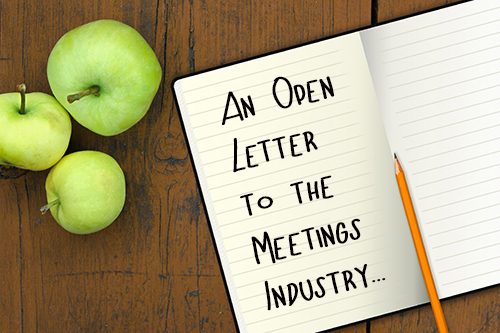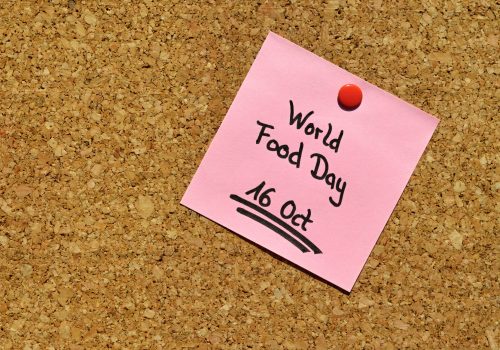Dear Meetings Industry,
In June 2016, I attended Meeting Professionals International (MPI) World Education Congress. As usual, the international conference was well attended and a wonderful gathering of top industry professionals. We studied food and beverage topics, budgeting, international trends, hybrid and virtual meetings and more. Added to this year’s event was a celebration of inclusion … mostly.
Unfortunately, the convention occurred on the heels of the tragic LGBT nightclub shooting in Florida, where 49 people were killed, over 50 were injured, and over 200 were held hostage until the gunman’s death, when police stormed the club around 2 a.m.
Deemed one of America’s largest mass shootings, the event was fresh in the minds of MPI attendees and MPI leaders we were called upon to address the solemn tone of the conference. We held a moment of silence, read the names of all those lost and embraced the theme of inclusion at the reception. It was appropriate and a beautiful act of solidarity among a close-knit group of international professionals.
I see this as a prompt to have a real discussion about inclusion. I can’t help but feel the need to charge the entire meetings industry with a call-to-action to celebrate inclusion, according to its truest meaning, at future industry events.
I’ve been speaking and writing about food allergies, as an invisible disability, for years. Yet, at each and every event, multiple attendees face significant unknowns when it comes to the food that is served. Attendees are forced to eat off-site because they cannot get simple, life-saving information about the food being served and its preparation, such as the possibility for cross-contamination.
I know several women who were forced to seek urgent medical care during industry conferences because they were having allergic reactions to the food they were served even though they had informed the organizations in advance and should have been able to ingest without issue. And, those are the ones I know of.
Generally, inclusion means we invite those who have been locked out of society, to come in. Because we are all born in society, we don’t have the authority to invite people into society. Instead, it is our responsibility to remove all barriers which uphold exclusion. Inclusion means we recognize our universal belonging, our interdependence, and in the meeting professionals industry, our duty of care to attendees. Assuring that all support systems are available to those who need such support, is not a favor; It is our civic responsibility and our duty.
Just a few simple steps will save lives and avoid alienating your guests. Survey attendees ahead of time and plan the menus accordingly. Label foods appropriately and ensure the kitchen prepares food at separate, cross-contamination-free stations, as needed. Educate and train the service staff to understand these precautions and to be able to communicate intelligently about the food and attendee needs. There is more that can be done, but these simple precautions remove significant barriers to participation at your events and speak to your ultimate goal of inclusion.
I am proud of my industry and of Meeting Professionals International for recognizing the Florida tragedy in such an open and inclusive way. I invite the entire industry to make inclusion an ongoing theme at all future events and to expand the meaning to cover our, yours and my, duty of care to all attendees. In this way, we will lead by example and remove the barriers for those with religious dietary needs, important lifestyle choices, and those with invisible disabilities, to include food allergies, autoimmune disorders, and intolerances.




4 Comments
Janine
I have some food allergies, and I find it demeaning and almost offensive that the term “invisible disability” is used in this article to describe food allergies. My food allergies are not a disability. It’s my responsibility to ensure that the foods I choose at an event don’t contain any of the items I’m allergic to, and if in doubt, I choose something else. The responsibility is mine alone. Typically, there is enough variety that I’m not going to go hungry or need to go off-site for food. It’s quite a leap to say that food allergies are a disability.
Tracy Stuckrath
Janine,
Thank you for your response. Taking responsibility for managing your own food allergies is extremely important and I commend you for acknowledging it. Some people do not.
How many times have you gone through a buffet at an event and found there is nothing for you to eat? What do you do in that instance? What about awards/banquet dinners were a plated meal is served? Can you kindly share if you let meeting planners know you have a food allergy or just attend and not eat? I personally feel that if I am paying to attend an event there should be something for me to eat.
Are you aware that in 2008, “eating” was added to the Americans with Disabilities Act Amendments Act as a major life activity like walking, seeing, hearing, sleeping? This was done to carry out the ADA’s objective to “provide a clear and comprehensive national mandate for the elimination of discrimination against individuals with disabilities” and to ensure that a person’s physical and mental disabilities should in “no way diminish a person’s right to fully participate in all aspects of society” (enjoying food at an event). To me, this is very important as it makes food establishments accountable for knowing what they are serving and how they prepare it.
As a professional event planner and a conscious human being, it’s my legal and ethical responsibility to ensure your participation in/at an event, and under “my care,” is worth the money you paid to attend and that you are kept safe. Safe from any outside intrusion or incident and safe from food that that may harm you.
Jessica Pettitt
Fantastic job. So many invisible elements are so out there and in front of us and yet we don’t talk about them. thank you for your work.
Where yes, it is our individual responsibility to take care of ourselves, meeting planners planning ahead of participant’s needs, associations thinking ahead of the member’s needs allows some space for a participant that does in fact need something to be included, feel included, and therefore they can be included as participants and members of the community as a whole.
Louis Buschman
Thank you Tracey.
This issue affects more people in the meetings industry than you would think. Most deal with the issue in resigned silence by either forgoing the meal and eating before or after the event OR they need to deal with food service staff who are uninformed or poorly trained.
Thankfully, the situation is getting better thanks in large part to the efforts of people like yourself who have made it their mission to get food allergies on the meetings industry agenda. Thank you for your continued efforts to make all people aware of the problems and more importantly, the solutions.
Comments are closed.